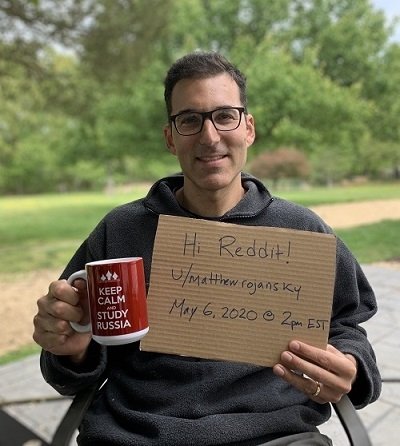Reddit “Ask Me Anything” with Kennan Director Matthew Rojansky

Although this event has ended, the Reddit Ask Me Anything is archived here where you can read the questions and answers that were submitted.
Kennan Director Matthew Rojansky hosted his first-ever Reddit "Ask My Anything" (AMA) about the US-Russia relationship, where he answered questions from Reddit users!

Amid conflict between Russia and Ukraine, Russia’s tide-turning intervention in Syria, and Russian interference in elections, it can sometimes seem like Russia is in the news every day. But the media’s narrative generally starts and ends with Putin and Trump. The Russian and American people, national interests, history, and so much more are buried or omitted altogether. Let’s peel back the layers and try to understand what’s going on in the US-Russia relationship.
Selected Excerpts
Q: “With INF dead and New START unlikely to be extended, do you see a future for nuclear arms control between the US and Russia?"
"This is probably the single most important topic now on the US-Russia agenda [...]. With so much at stake, and the current situation far from ideal but much better than having no constraints on nuclear arsenals and no transparency, why wouldn’t we extend the treaty for another 5 years? In that time, we could begin negotiations in earnest toward a replacement, which might then bring in other types of weapons that are not covered under the current language and we might even be able to engage other nuclear powers, like China, Britain and France, to make it a multilateral deal. That’s a tall order, and it sure isn’t going to happen if the US and Russia signal they don’t care enough even to preserve the deal they have now."
Q: "Can you talk about the constituencies Putin has to appease when making foreign policy?"
"The idea of constituencies in Russian foreign policy is an interesting one. I would not think about it the same way you would about constituencies in US or European politics. Even in the West, foreign policy is a pretty elite-dominated space. But in Russia that is 100% the case. Therefore the parties at interest in formulating Russian foreign policy are essentially the various rings and layers of influencers around Putin in the first place. That includes but is not limited to his formal cabinet (PM, Foreign minister, Defense Minister, deputy ministers, etc.), his own advisors, the top figures in the legislative bodies and, to a much lesser extent, the relevant committees of those bodies, the intelligence services (especially the SVR, successor to the part of the KGB where Putin himself worked, plus the military spy agency GRU), and finally the oligarchs."
Q: "Was there ever a chance for the NATO alliance to include Russia as a full-time partner?"
"During the George HW Bush years, the US did not look to actively enlarge NATO, though even by 1992/93 it was clear that some former Warsaw Pact countries were interested, and that Russia would oppose this [...] But by the Clinton years, the US view began to shift, in part because of domestic politics and skillful diplomacy by the Central/East European states themselves, and in part because of some very serious miscommunication between the US and Russian leadership. One variant that was quite seriously considered but ultimately left by the wayside, was to pursue a more inclusive 'partnership for peace' rather than NATO enlargement per se, and to include Russia in this partnership. Suffice to say, that did not happen, and instead Russia found itself very much on the outside looking in. The other side of the story is that NATO enlargement and EU accession afterwards provided most of the former communist states of Central and Eastern Europe with the only really iron-clad assurances of their future security and prosperity, which in turn required them to fully commit to democratic and free market principles."
Q: What is your opinion of Zelenskyy 's first year in the office and how you think that the situation is going to evolve in Ukraine?
"I had very high hopes for this past year, since Zelenskyy's election last spring. Unfortunately, much of what could have been achieved has not been. Some of that can be forgiven in view of the pandemic, which has rattled Ukraine like every other country. But much of it was going sideways long before the pandemic. On the top priority issue of peace in Donbas, the negotiations held early promise, but for the past half year they have essentially been frozen. Zelenskyy has had no magic ability to compel concessions from the Russian side, and he is under the same intense domestic pressure not to make concessions that his predecessor was, so he is essentially stuck. On the economy, the pandemic has already wiped out any gains for this year and likely for years ahead. Ordinary people, who voted for Zelenskyy because he promised to improve their living conditions, are feeling that pain especially and this will get worse the longer the lock down impacts normal economic activity. And finally, anti-corruption reform is very much on the rocks [...] I don't necessarily presume that Zelenskyy himself has gone down the same corrupt road as his predecessors, but he is president, his party dominates the Rada (despite recent fragmentation, it's still a powerful block), and the buck stops with him."
Speaker

President and CEO, US Russia Foundation
Hosted By

Kennan Institute
After more than 50 years as a vital part of the Wilson Center legacy, the Kennan Institute has become an independent think tank. You can find the current website for the Kennan Institute at kennaninstitute.org. Please look for future announcements about partnership activities between the Wilson Center and the Kennan Institute at Wilson Center Press Room. The Wilson Center is proud of its historic connection to the Kennan Institute and looks forward to supporting its activities as an independent center of knowledge. The Kennan Institute is committed to improving American understanding of Russia, Ukraine, Central Asia, the South Caucasus, and the surrounding region through research and exchange. Read more
